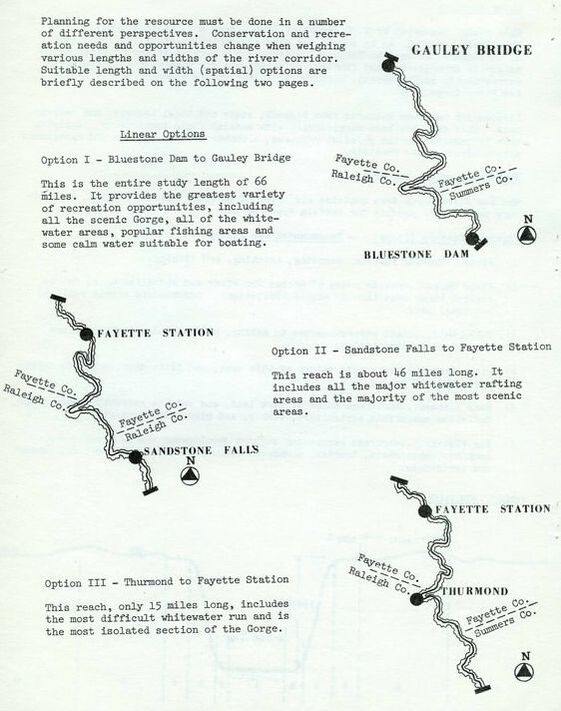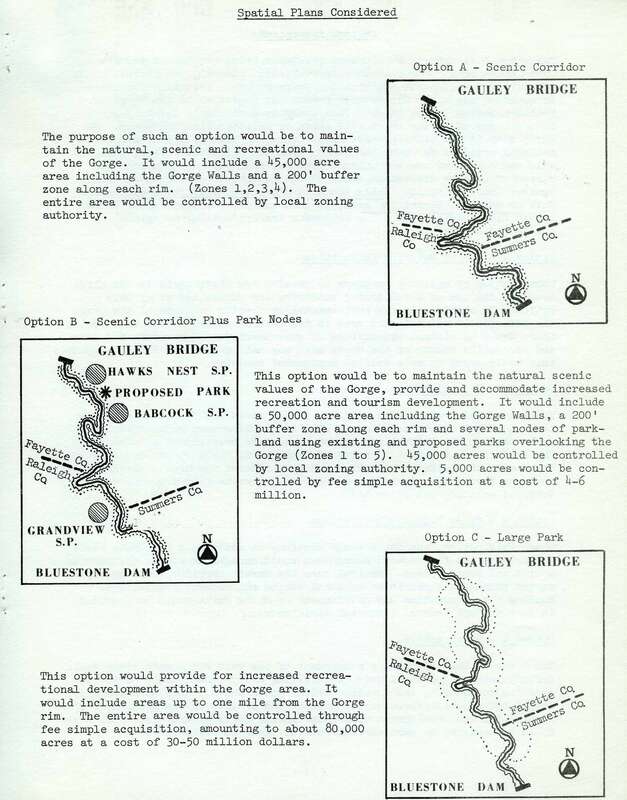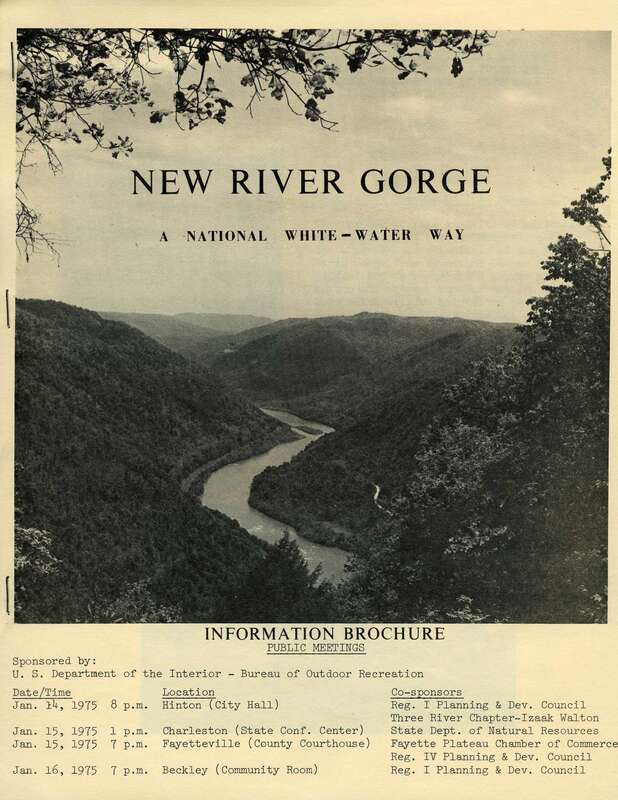|
By Richard Jones
Byrd Center Student Intern
Click the maximize button (lower right corner) to view this digital timeline full-screen.
The study was first proposed by West Virginia Senators Robert Byrd and Jennings Randolph in 1974 in order to review the resources present at the New River Gorge and if preservation and protection is needed for them. In 1975, $150,000 was given from the United States Department of the Interior to the Bureau of Outdoor Recreation to conduct a study on the gorge. The study had three main thrusts to it - to assess the physical capabilities of the gorge, to compare the area to the criteria of the National Park Service and determine which designation is appropriate and to recommend a plan that recognizes the recreation, environmental, historical, cultural and economic values of the New River Gorge. The information was gathered from a mixture of Federal, state and local agencies as well as individuals from the area. The study also required several visitations and inspections to the New River Gorge to determine the usage of the physical features and resources of the area as well as management options.
The physical features of the New River Gorge that the study determined could be utilized were the river, riverbanks, the gorge wall, the rim and the near and far portions of the plateau. The study determined the river provides rafting, canoeing, kayaking, and fishing opportunities while the riverbanks provide scenic railroad and trail uses. The walls and rims of the New River Gorge could be used for hiking and scenic trails and natural and historical studies. The plateau supports economic and commercial development within the New River Gorge area. The spatial area of the New River Gorge park was also considered, and three different options were given by the bureau, with Option B - the scenic corridor for the entire study length plus park nodes - being considered the best. Of the management options considered, the continued use of existing authorities, a federal action option, the joint federal-state action option, or state action option, with the joint federal-state action being decided upon.
Proposed spatial plans for protected areas in the New River Gorge (1974).
The study of the New River Gorge was presented in public meetings to gather input from both Congressmen and the general population of the area. The meetings were overshadowed by the concerns of industries and projects that had interest or presence in the New River Gorge and how the implementation of the National Park Service would affect them. Numerous coal and mineral companies had previously owned land in the gorge and had conducted strip and deep mining in the area. The Appalachian Power Company had also begun planning for the construction of a hydroelectric dam that would utilize the New River to power it, though at the expense of other areas of the gorge as well as nearby farms and private properties. The designation of the New River Gorge was also met with controversy as the area could potentially qualify as a National Park, National Recreation Area or as a National Wild and Scenic River. The Bureau of Outdoor Recreation found that the gorge was too developed to qualify as a national park and recommended that a National Wild and Scenic River would be the best designation [1].
Following the New River Gorge study, Senator Byrd corresponded with attorney Edmund C. Stone over concerns of the implications of the area's new designation, notably those by coal companies who owned land in the gorge. To address these concerns, Senator Byrd secured an appropriation for the Department of Interior for a coal study in the gorge to occur. Beyond the issue of coal, the potential construction of the hydroelectric dam also had to be considered. The construction of the dam was subject to numerous court battles up to 1975, though a federal court ruled in favor of the project advancing in that same year. In 1976, Senator Byrd urged for the river to preserved in its natural state, and asked the Department of the Interior to prevent the construction of the hydroelectric dam on the river, arguing that the river should be preserved in its natural state and its status as one of the oldest rivers in the world and the oldest river in the Western Hemisphere should be recognized. The same year, the North Carolina portion of the New River was designated as a National Wild and Scenic River, with a previous designation of a State Scenic River given in 1975. These designations helped to deter the construction of the hydroelectric dam on the New River, and eventually led to the project’s abandonment [2].
The 1975 New River Gorge study eventually allowed for serious discussions to occur about the site’s management under the National Park Service. The study itself was initially met with concerns by those already present in the gorge area, and how its potential designation could negatively affect them. These issues were the center of the debate of the preservation of the New River Gorge in the years following the study and made its chances of being designated as a National Park appear slim. By 1978, however, Congress had passed legislation allowing the New River Gorge to be designated as a National Wild and Scenic River, preserving the nearly 60 miles of river while not interfering with the private property already in the area. Senator Byrd wrote to President Jimmy Carter urging him to sign the legislation for the creation of the New River Gorge National River, which he did in November of 1978. The New River Gorge held its National River designation for over 40 years, before being upgraded to a National Park and Preserve designation in December of 2020. Sources: [1] Maxwell, R. Stockton, and Ray R. Hicks. “Fire History of a Rimrock Pine Forest at New River Gorge National River, West Virginia.” Natural Areas Journal. Natural Areas Association. Accessed June 22, 2021. https://bioone.org/journals/natural-areas-journal/volume-30/issue-3/043.030.0311/Fire-History-of-a-Rimrock-Pine-Forest-at-New-River/10.3375/043.030.0311.full. [2] U.S. Department of the Interior. “New River Gorge National River Administrative History.” Washington D.C.: National Park Service, 2008. https://www.nps.gov/parkhistory/online_books/neri/neri_admin_history.pdf Comments are closed.
|
Welcome to the Byrd Center Blog! We share content here including research from our archival collections, articles from our director, and information on upcoming events.
Categories
All
Archives
July 2023
|
Our Mission: |
The Byrd Center advances representative democracy by promoting a better understanding of the United States Congress and the Constitution through programs and research that engage citizens.
|
Copyright © Robert C. Byrd Center for Congressional History and Education
|




 RSS Feed
RSS Feed
